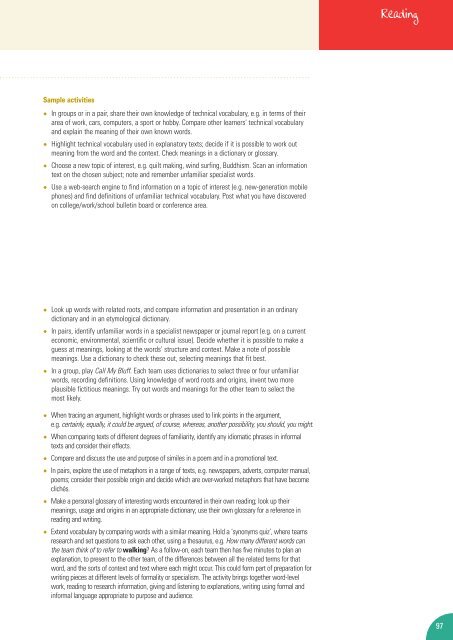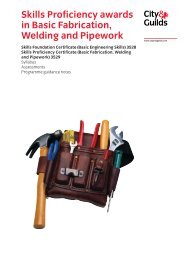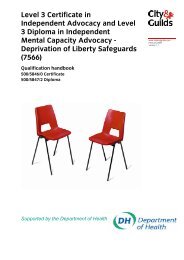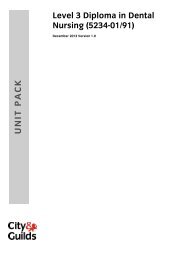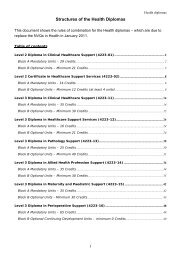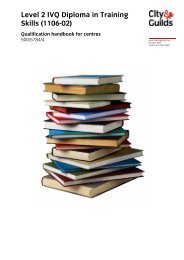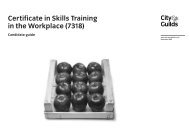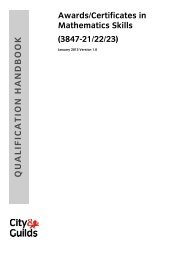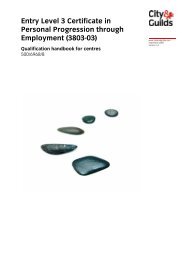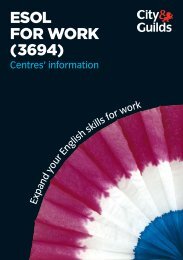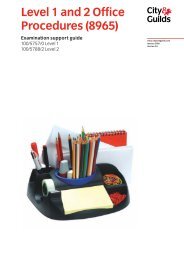Adult Literacy Core Curriculum - Nationally developed Skills for Life ...
Adult Literacy Core Curriculum - Nationally developed Skills for Life ...
Adult Literacy Core Curriculum - Nationally developed Skills for Life ...
You also want an ePaper? Increase the reach of your titles
YUMPU automatically turns print PDFs into web optimized ePapers that Google loves.
Sample activities<br />
• In groups or in a pair, share their own knowledge of technical vocabulary, e.g. in terms of their<br />
area of work, cars, computers, a sport or hobby. Compare other learners' technical vocabulary<br />
and explain the meaning of their own known words.<br />
• Highlight technical vocabulary used in explanatory texts; decide if it is possible to work out<br />
meaning from the word and the context. Check meanings in a dictionary or glossary.<br />
• Choose a new topic of interest, e.g. quilt making, wind surfing, Buddhism. Scan an in<strong>for</strong>mation<br />
text on the chosen subject; note and remember unfamiliar specialist words.<br />
• Use a web-search engine to find in<strong>for</strong>mation on a topic of interest (e.g. new-generation mobile<br />
phones) and find definitions of unfamiliar technical vocabulary. Post what you have discovered<br />
on college/work/school bulletin board or conference area.<br />
• Look up words with related roots, and compare in<strong>for</strong>mation and presentation in an ordinary<br />
dictionary and in an etymological dictionary.<br />
• In pairs, identify unfamiliar words in a specialist newspaper or journal report (e.g. on a current<br />
economic, environmental, scientific or cultural issue). Decide whether it is possible to make a<br />
guess at meanings, looking at the words’ structure and context. Make a note of possible<br />
meanings. Use a dictionary to check these out, selecting meanings that fit best.<br />
• In a group, play Call My Bluff. Each team uses dictionaries to select three or four unfamiliar<br />
words, recording definitions. Using knowledge of word roots and origins, invent two more<br />
plausible fictitious meanings. Try out words and meanings <strong>for</strong> the other team to select the<br />
most likely.<br />
• When tracing an argument, highlight words or phrases used to link points in the argument,<br />
e.g. certainly, equally, it could be argued, of course, whereas, another possibility, you should, you might.<br />
• When comparing texts of different degrees of familiarity, identify any idiomatic phrases in in<strong>for</strong>mal<br />
texts and consider their effects.<br />
• Compare and discuss the use and purpose of similes in a poem and in a promotional text.<br />
• In pairs, explore the use of metaphors in a range of texts, e.g. newspapers, adverts, computer manual,<br />
poems; consider their possible origin and decide which are over-worked metaphors that have become<br />
clichés.<br />
• Make a personal glossary of interesting words encountered in their own reading; look up their<br />
meanings, usage and origins in an appropriate dictionary; use their own glossary <strong>for</strong> a reference in<br />
reading and writing.<br />
• Extend vocabulary by comparing words with a similar meaning. Hold a ‘synonyms quiz’, where teams<br />
research and set questions to ask each other, using a thesaurus, e.g. How many different words can<br />
the team think of to refer to walking? As a follow-on, each team then has five minutes to plan an<br />
explanation, to present to the other team, of the differences between all the related terms <strong>for</strong> that<br />
word, and the sorts of context and text where each might occur. This could <strong>for</strong>m part of preparation <strong>for</strong><br />
writing pieces at different levels of <strong>for</strong>mality or specialism. The activity brings together word-level<br />
work, reading to research in<strong>for</strong>mation, giving and listening to explanations, writing using <strong>for</strong>mal and<br />
in<strong>for</strong>mal language appropriate to purpose and audience.<br />
Reading<br />
97


